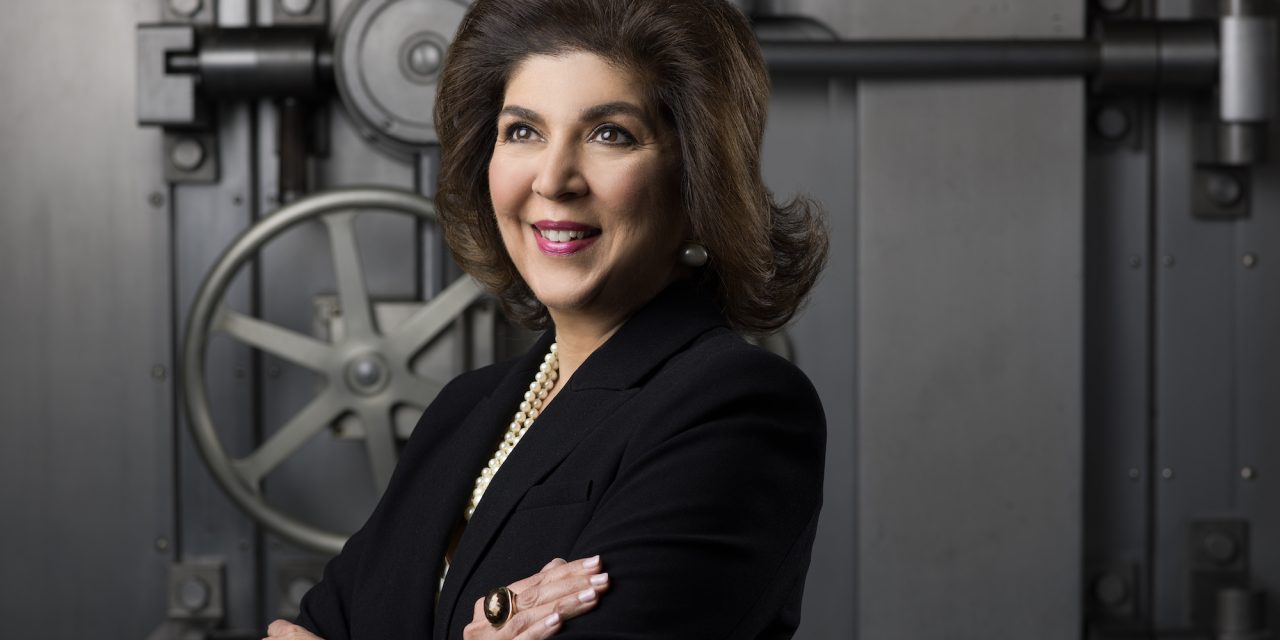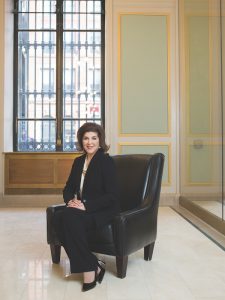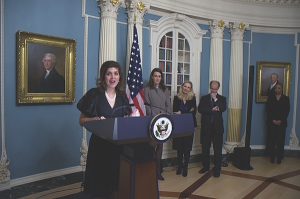
Soft Power: A Defense Against Extremism

Engaging with Muslim communities around the world, foreign-policy strategist Farah Pandith ’86 pioneered a new approach to fighting extremists and changed the narrative around how radicalization occurs and how to stop it.
Story by Sarah Abrams
Photographs by Jimell Greene
The day that set Farah Pandith ’86 on the path to becoming one of the United States’ top counter-extremism experts is one she will not soon forget. She was working in Boston at the law firm Mintz Levin as vice president of international business when Osama Bin Laden launched an attack on American soil, killing almost 3,000 people.
“9/11 was transformative,” Pandith says. “I walked into my boss’s office and said, ‘I’m an American; I’m a Muslim. Surely, there is some- thing I can do to help our nation.’ Here’s this guy who’s trying to claim the mantle of my religion and saying, ‘America hates Muslims.’ For me, all the lies that spewed out of him were a call to action.”
By 2003, she was serving in the George W. Bush administration, first at the U.S. Agency for International Development (USAID), and then as director for Middle East Regional Initiatives for the National Security Council, where she worked on the “war of ideas,” the ideology behind violent extremism. She moved to the Department of State so that she could work closely with embassies. Traveling to communities throughout Europe, Pandith and her team began a new kind of engagement, which included talking with individuals who had adopted extremist philosophies, and asking tough questions: “How are foreign concepts able to come into your community and convince you as a young 14-year-old or 17-year-old that you need to hate and that you don’t belong? What are the ideologies that they’re selling you?”
“Lots of theories existed then about why somebody would possibly decide to do something so horrific [as 9/11], but at the end of the day, we learned that it isn’t about education levels. It isn’t about what part of the world you’re born in,” Pandith says. “It turns out, you can be really well educated and really wealthy and still get radicalized. We see that today, too, with what is happening in America with the rise of antisemitism and hate of all kinds.”
A central component of how people get radicalized, Pandith discovered, was identity and belonging. She soon realized that change would not happen through government top-down solutions but by employing multilevel, soft power approaches: learning how to listen, engage, and build trust and understanding the importance of dignity and respect.
At the Council on Foreign Relations in Washington D.C., where she now serves as an adjunct senior fellow, Pandith talks about how the seeds of her work championing listening, engagement, and respect were planted at Milton Academy.
“A sense of public service really was deeply instilled in me at Milton. It was made very clear that you volunteer your time for something bigger than yourself; you think about the community around you; you do as much as you can to foster relationships. That effort to build understanding, to engage, to increase communication—I learned that at Milton.”
Born in Kashmir, India, Pandith attended Milton from kindergarten through high school. She felt a part of the Milton community from the start, she says. “I had wonderful classmates and rich friendships. Milton was not diverse at that time, but my classmates treated me like everybody else. I never thought about issues of identity ever.” As Upper School class copresident, Pandith was deeply involved in the school’s culture, representing her class to the administration.
“Those fundamental aspects of feeling confident about who you are—never thinking you are different, knowing you belong, having classmates and teachers who support your interests—help to make you who you are,” she says. “And I will tell you, that helped make me who I was.”
 Pandith’s commitment to serving a larger purpose followed her to Smith College. There, a speech on diversity she delivered as student body president led to her first government position. Her speech at the start of her senior year caught the attention of First Lady Barbara Bush, a member of the Smith class of 1947, who was in attendance. Pandith corresponded with the first lady throughout her senior year, and she was invited to the White House to discuss her future plans.
Pandith’s commitment to serving a larger purpose followed her to Smith College. There, a speech on diversity she delivered as student body president led to her first government position. Her speech at the start of her senior year caught the attention of First Lady Barbara Bush, a member of the Smith class of 1947, who was in attendance. Pandith corresponded with the first lady throughout her senior year, and she was invited to the White House to discuss her future plans.
“I remember saying that I wanted a job that was international and one where I could make a difference,” says Pandith, who began working at USAID in the George H.W. Bush ad- ministration. “That’s how I got my first job,” she says, still surprised by the serendipitous nature of the start of her career.
Pandith later went on to earn a master’s degree at the Fletcher School of Law and Diplomacy at Tufts University, where she focused on security studies. For her master’s thesis, she interviewed militants involved in the struggles between India and Pakistan. “It was my James Bond summer,” she recalls. “I went in under the radar of the Indian government doing interviews, and I began to learn about extremism. It was fascinating.”
Her early work at USAID was foundational, Pandith says, for the work she would take on after 9/11 for the George W. Bush administration and later for the Obama administration. She expected her work to end when leadership changed hands, but in 2009, after briefing Hillary Clinton, the Obama administration’s new secretary of state, about the previous administration’s efforts to counter violent extremism, she was asked to join the new administration. “I briefed her on everything we had done, and she said, ‘You’re not going anywhere. I want you to do what you did, but I want you to do it around the world.’” Pandith was appointed to the newly created position of Special Representative to Muslim Communities.
Traveling to almost 100 countries, she began scaling up and building out the kinds of soft power solutions she had learned mattered in her earlier work, deploying initiatives and programs to fight hate and extremism. She engaged, listened, and asked questions: What is happening in Mali? Is there any connection between what’s happening there and what’s happening in Indonesia? Do we see any synergy and understanding between a young person in Guyana and somebody in Norway?
As she had discovered in Europe, identity and belonging were central to how radicalization and extremism take hold. To stop radicalization, “we’ve got to think about it from the perspective of society and our shared cultures,” Pandith says. “Observe what’s happening within your community. What do you know that’s actually happening in a school, in a town, in a state? Understand it from the perspective of solving a problem through strategies that happen at the local level. It can’t just be the government that works on this. It’s got to be all of us. All of us have a role to play.”
Almost 22 years after 9/11, Pandith believes societal change can happen. Many of the questions that have been asked about how to come together so that ideologies of hate don’t thrive now have answers, she says. The structure for fighting hate and extremism has become more sophisticated than it was on 9/11.
In 2019, Pandith authored How We Win: How Cutting-Edge Entrepreneurs, Political Visionaries, Enlightened Business Leaders and Social Media Mavens Can Defeat the Extremist Threat, which lays out the decades-long efforts of two administrations to counter extremist ideology. “Us-versus-them ideologies are a growth industry in America today,” Pandith says. “It is a serious national-security threat. What we are witnessing is unprecedented.
“Unlike September 12th, 2001, when we didn’t know what to do, solutions are now available and affordable. There’s now a national strategy for how to deal with these kinds of threats. There are systems in place on an international level that mobilize multilateral organizations. There’s a government response that is far more mature, and NGOs are leading new efforts.”
And at the community level, Pandith says, “there’s a lot of creativity and desire that exists with people who have an interest in finding out ways to make their neighborhoods and communities less appealing to those who would try to radicalize.”
“Soft power gives us the tools we need to deal with making our societies more resilient to hate and extremism,” she says. “And treating people with respect despite their differences should not be a shocking and new thing. It should be fundamental to who we are. It should be ingrained in the way in which we operate. As someone who grew up feeling like I belonged, feeling recognized and respected by my classmates at Milton, when bin Laden attacked our country and tried to create a narrative about what America was, it made me very angry, because I knew what America was. I have lived it.”




